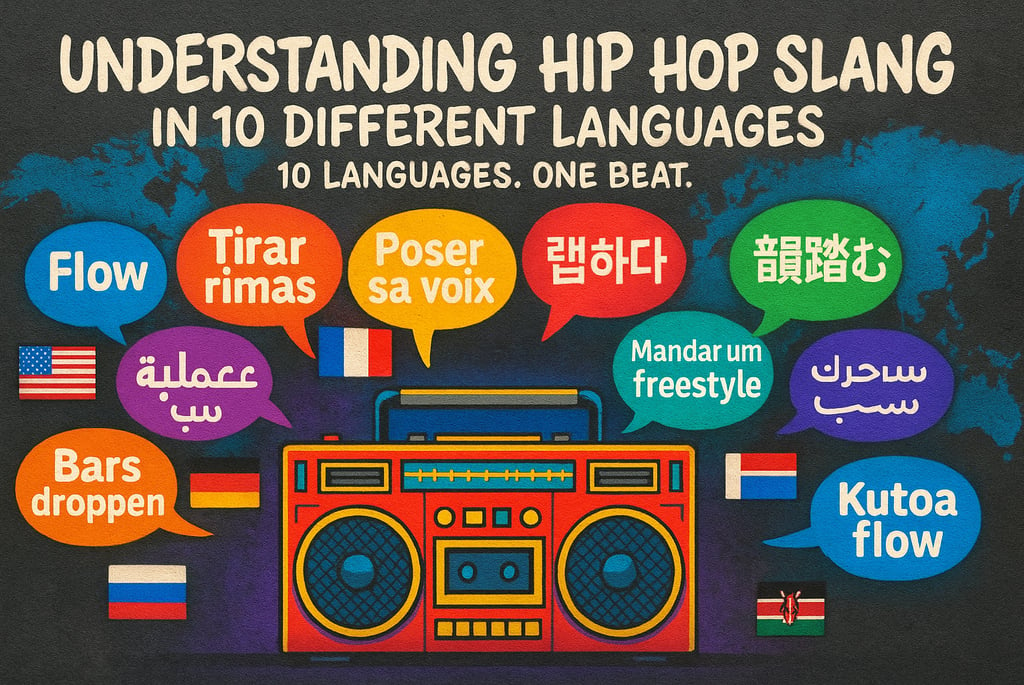Hip Hop Slang in 10 Languages Explained
8/16/20252 min read


Hip hop slang is more than mere jargon—it’s a living lexicon that reflects culture, identity, and creativity across the globe. Here’s a deep dive into ten languages’ most iconic hip hop terms, their meanings, and how they shape local rap scenes.
1. English: “Flow”
Originally denoting a rapper’s rhythmic cadence and seamless lyrical delivery, “flow” now symbolizes overall skill and confidence on the mic. MCs praise peers as “having dope flow” when their verses glide effortlessly over a beat.
2. Spanish: “Tirar rimas”
Literally “to throw rhymes,” this phrase captures the act of spitting bars. In many Latin American scenes, MCs challenge each other to “tirar mejores rimas” (drop better rhymes), emphasizing lyrical prowess in Spanish-language cyphers.
3. French: “Poser sa voix”
Meaning “to lay down one’s voice,” this term refers to recording vocals or freestyling over a beat. It underscores the artistry in vocal tone, tone-matching, and vocal presence that French rappers prize.
4. Korean: “랩하다” (raep-hada)
A verb simply meaning “to rap,” derived from the English “rap.” Still, its usage in everyday Korean hip hop illustrates how seamlessly English terms are integrated into K-rap, reflecting global influence while adopting native syntax.
5. Japanese: “韻踏む” (in-fumu)
Translating to “step on rhymes,” this slang highlights the crafting of internal and end rhymes. Japanese MCs focus intensely on complex rhyme schemes—“in-fumu” sessions often feature multi-syllabic patterns that challenge rapid-fire delivery.
6. Portuguese (Brazil): “Mandar um freestyle”
Literally “to send a freestyle,” this phrase describes off-the-cuff rap improvisation. Brazilian crews gather in favelas for “freestyle battles,” elevating the art of spontaneous wordplay in Portuguese.
7. Arabic: “سب عملية” (sab ‘amaliyya)
Meaning “to spit” (as in “spit bars”), this term plays on the metaphor of spitting as a forceful, visceral act. In Egyptian and Levantine scenes, MCs refer to delivering powerful verses as “sab ‘amaliyya قوية” (spitting hard bars).
8. German: “Bars droppen”
A hybrid of English and German—“bars” (lyrics) and “droppen” (to drop)—this slang underscores Germany’s bilingual rap culture. Artists proudly announce, “Ich droppe fette Bars” (I drop fat bars), marrying German word order with English terminology.
9. Russian: “Чиллить” (chillit’)
Adopted from English “chill,” Russian rappers use “chillit’” to mean relaxing or vibing to a track. In post-Soviet hip hop clubs, DJs cue “time to chillit’” before easing the energy into laid-back beats.
10. Swahili: “Kutoa flow”
Combining the English “flow” with Swahili “kutoa” (to give), this phrase celebrates rhythmic delivery: “Kutoa flow kali” means “delivering a fierce flow.” East African MCs are known for integrating Kiswahili poetry into rap cadences, reinforcing localized expression.
Hip hop slang transcends language barriers by blending local idioms with global influences, creating a vibrant, ever-evolving tapestry of expression. Whether you’re “flowing” in English or “kufreestyle” in Swahili, these terms are proof that hip hop’s linguistic creativity unites artists and fans around the world.

🎶 Get The Bars, The Beats, The Backstories – Direct to Your Inbox.
Send your Articles
Stay updated with the latest hip hop trends.
Stay Connected
rap@grillg.com
+91-9911428513
© 2024. All rights reserved.
